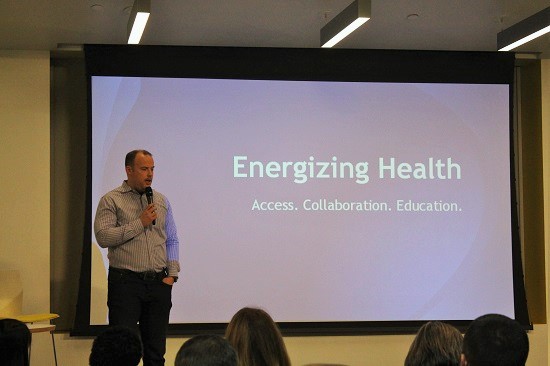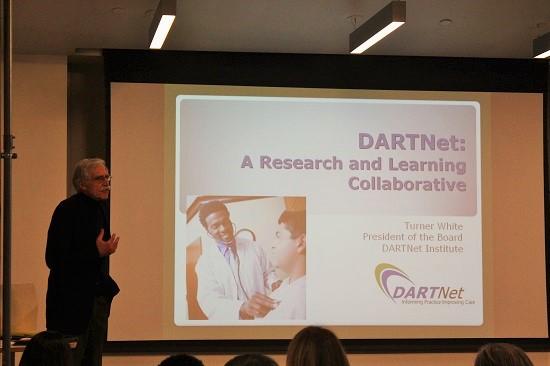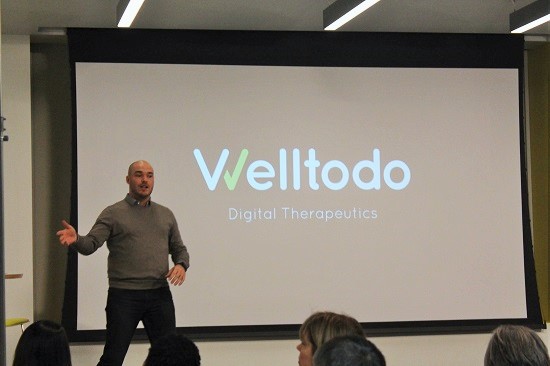Collaboration was the theme of KC Digital Drive’s Dec. 4 Digital Health Innovation Forum. At this second event in an ongoing, quarterly series, around 40 participants interested in digital health and innovation gathered at the Sprint Accelerator in Kansas City, Missouri, to share ideas for improving health care.
Energizing Health Series
Dominique Pahud, senior research fellow at the Ewing Marion Kauffman Foundation, delivered the keynote address. Pahud was chief city architect for the Energizing Health Collaboration Series, a four-city event that created collaboration between hospital systems, payers, technologies and other industry leaders. The event was developed by Kauffman Foundation in partnership with Health Data Consortium.
The series involved a group of selected entrepreneurs. They discussed collaboration and access to development opportunities with key stakeholders within health care. New collaboration tools and best practices were introduced that will enable partners and entrepreneurs to handle data standards and ownership rights. Intellectual property and shared information on what makes collaborations work was also presented. The Kauffman Foundation collected data and outcomes from each event and will study the interactions and collaborations that resulted.
The product of this analysis will be a publication of the findings. Pahud also plans to build out an education initiative boot camp to forge a business/sustainability model.
“There’s no right or wrong place to start. Just start,” Pahud said.
Tech companies presented their businesses after the keynote presentation.
MySmartVisit
Aaron Gray, MD, is a family practice physician in the University of Missouri system. His company, MySmartVisit.com, is designed to cut down on paperwork and inefficient documentation. It allows patients to describe their medical history and current issues via algorithm-driven online forms.
As a physician, Gray attested to the enormous amount of time doctors spend on paperwork. “Computerized records sap doctors’ time,” Gray said.
Not only does this contribute to doctor burnout, Gray said he sees patients struggling too. Physicians are distracted by computers when meeting with patients as they enter data into the electronic medical records (EMRs). Gray believes technology can help make time more meaningful between patients and physicians by eliminating time spent on paperwork.
And since Gray believes doctors and entrepreneurs have something in common — they both like to solve problems – he said it was logical to develop a startup using technology to solve a problem he found in his own practice and that of others.
In surveys, Gray learned documentation was taxing many other doctors. Even though EMRs have helped collect data, the time taken to enter data has been taxing to health care providers. They are spending a lot of time on the computer. When meeting with patients, their attention is now distracted with the computer.
MySmartVisit is a web-based, HIPAA-compliant website for patients to provide documentation prior to a medical visit.
The benefit to doctors is that they will spend less time on patient notes. The benefit to patients is that it will eliminate the need for patients to fill out paperwork in the office. They can complete the patient questionnaire online. The doctors are able to review the questionnaire before the office visit. And a calendar reminder can be programmed into the patient calendar. The data collected can also uploaded to the EMR system.
“This helps return medicine back to patients and away from paperwork,” Gray said.
DARTnet
KC’s DARTnet Institute has collaboration at the center of its project. This company transfers practice-based data to patients so they can better manage their care. Turner White, DARTnet president, talked about his rapidly growing not-for-profit.
The organization’s mission is to improve health and health care through data-driven methods. They do this by extracting data from EMRs, researching the data and sharing it back with the providers. The end result is learning more about a disease and/or treatment that could be useful to other providers and ultimately patients. White said it’s about using data for quality improvement.
“The big opportunity is to transfer practice-based research networks to patient-based networks,” White said. “We are very much interested in answering questions from people wanting this data.”
Providers participate through direct membership, services and contracting, regional data networks, individual clinician practices or colleges of medicine. DARTnet uses 20 different EMRs and has 12 patient-based research networks (PBRN).
WellToDo
Rounding out the evening was Chris Cardinal, founder of WellToDo, a service that develops digital therapies that empower and provide relief to chronic disease sufferers by leveraging the growing availability of personalized data.
With a background in digital engagement, primarily with political campaigns, Cardinal tapped into his expertise to build the platform – CANARY. As a result of his experience, he has created a quantifiable means of tracking personal health data.
Cardinal’s current digital therapy is called Migraine Coach. According to Cardinal, There are 991 million migraine sufferers in the world and 43 million in US. He said the platform tracks migraine triggers that can help people manage their illness and possibly avoid situations that bring about an episode.
“We put the users through a journey to track their experience,” Cardinal said. They take the information, analyze the data and send push notifications to the patient.
With an estimated 75 percent of health care costs due to chronic disease and an estimated 85 percent are avoidable costs due to health behaviors, Cardinal said it makes sense to consider using digital therapies. In fact, he said the CANARY platform also could be used for tracking other chronic diseases. Behavioral medicine, such as digital therapies, can help reduce health care costs.
Although Cardinal said it would be nice if digital therapies could replace some pharmaceutical, he said that’s not likely in the immediate future.
“We will be a supplement to traditional care plans,” Cardinal said. Migraine Coach will be ready for beta testing in 2015.
The Digital Health Innovation Forums are sponsored by Reach Healthcare Foundation, Kansas City Area Life Sciences Institute, and Sprint Accelerator powered by Techstars. The next Forum will be Feb. 26, 2015.



